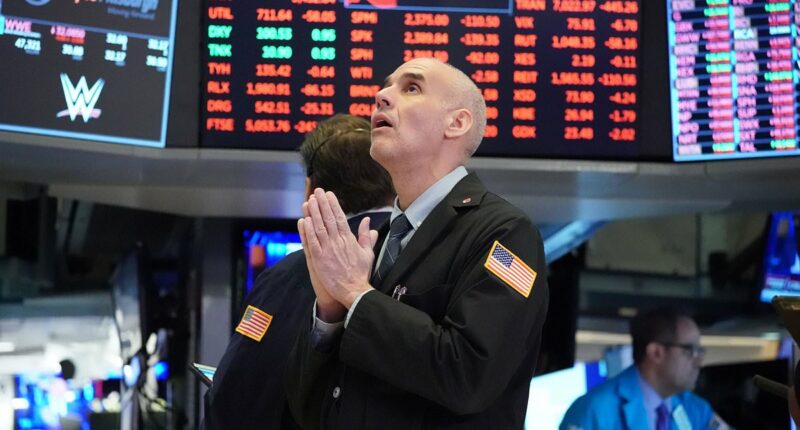Share this @internewscast.com
Wall Street faced another turbulent day on Monday, dealing a fresh setback to American retirement accounts as both stocks and cryptocurrency continued their sharp decline throughout November.
The Dow Jones Industrial Average dropped by 1.2%, while the S&P 500 and Nasdaq each experienced losses of just under 1%.
Bitcoin also suffered a hit, falling nearly 3% to dip below $92,000, extending a troubling 25% drop since its peak in early October.
This wave of selling has significantly impacted CNN’s Fear & Greed Index, which plummeted to a score of 14 out of 100 by Monday evening. This index measures market sentiment through seven indicators, including momentum and stock price strength.
This is the lowest level since April, a time when former President Donald Trump announced unexpected tariff increases.
During that period, the index reached a low of 3 before rebounding to 78 in July as the market hit a series of new highs.
On Monday, tech stocks were among the hardest hit, as traders nervously brace for Nvidia’s earnings on Wednesday.
Wall Street is hoping for another blockbuster quarter from the world’s only $5 trillion company — but anything short of perfection risks worsening the gloom.

Investors saw stocks plunge again on Monday, extending last week’s rough stretch of trading
‘Nvidia serves as the leader of the AI revolution — and AI has been a leading catalyst for this bull market,’ Bret Kenwell, a US investment analysts at eToro, told Daily Mail.
‘That’s why there’s so much focus on its earnings this week.’
Investors have been flooding cash into the chipmaker for nearly two years, and to many, it is the bellwether for AI’s effectiveness.
‘It’ll be, on one hand, important for Nvidia to confirm that demand is still there, that they’re not seeing a slowdown,’ Ross Mayfield, an investment strategist at Baird, told CNBC.
‘But unless they take it a step further, I think it’s only going to leave the second question more open-ended, which is, “We know there’s demand for compute, so what is the return on investment for the firms that are buying all of these chips?”‘
There are more clues later this week on the state of the US economy.
Walmart reports earnings before the market opens on Thursday, and those results could reveal just how stretched the American shopper really is.
Thursday also brings the September nonfarm payrolls report — the first major economic release since the government shutdown froze key data.

All three major indexes sunk on Monday
Some of AI’s biggest cheerleaders think the technology is going to save billions of dollars in costs.
For example, Morgan Stanley estimates that AI adoption could unlock nearly $1trillion a year in net benefits for S&P 500 companies.
But not everyone is convinced. Some of the market’s biggest skeptics are now warning that the AI boom may be losing steam.
Among them is Michael Burry, the Big Short investor who famously predicted the 2008 financial crash.
In early November, filings revealed he had made a huge bet that Nvidia’s share price will fall.
Then, last Tuesday, Masayoshi Son, one of tech’s most–watched investors, revealed he quietly sold off all his Nvidia shares and most of his stake in T-Mobile last month.
Both moves were read as a warning sign that the AI boom — the same one that has powered record stock gains for companies like Nvidia, Microsoft, and Palantir — might finally be wobbling.
Last Thursday, the Volatility Index, otherwise known as Wall Street’s fear gauge, jumped nearly 20 percent.
‘With increased uncertainty comes increased volatility — and that’s exactly what we’ve seen so far in November,’ Kenwell added.
‘But not all hope is lost. While the S&P 500 is letting off some steam, investors need to remember that the index is up significantly from its April low and has enjoyed a six-month rally.’

















